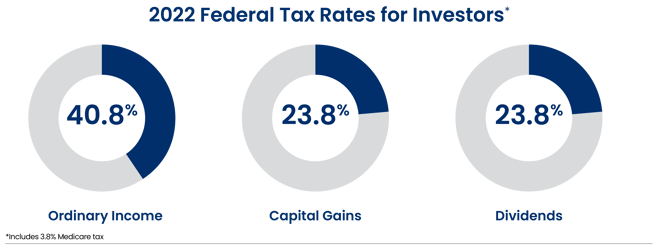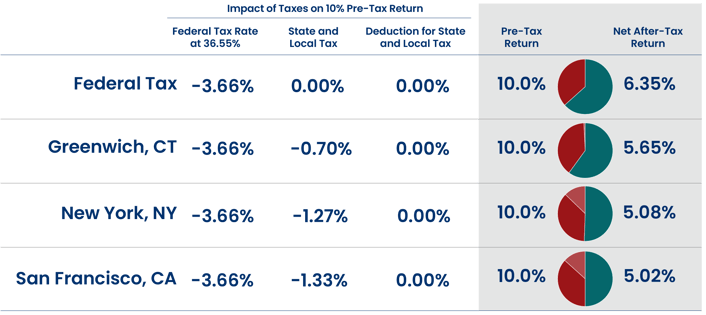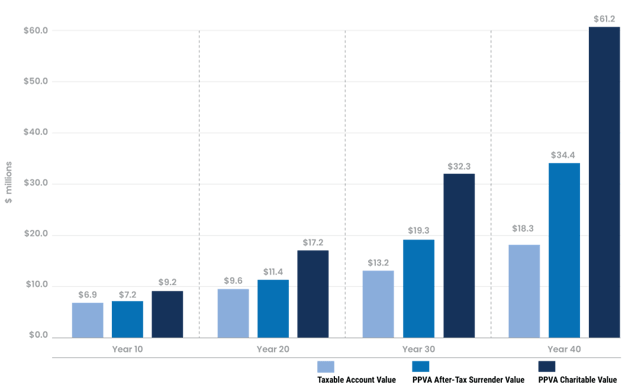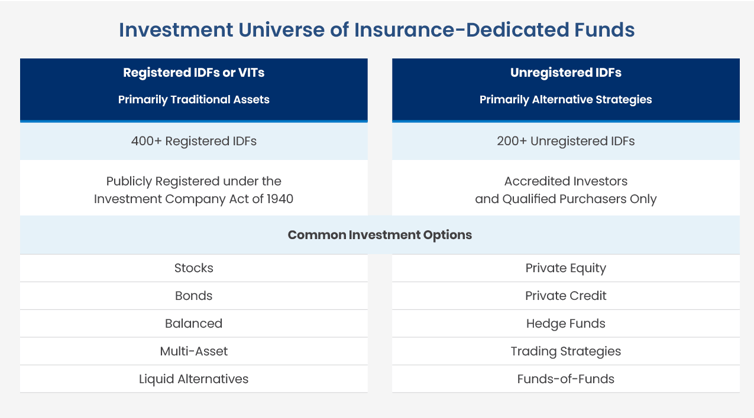How to Grow Wealth Tax-Deferred with Private Placement Variable Annuities
Learn how to meet the unique needs of your most affluent clients
Do you serve or seek highly affluent investors in your financial advisory practice?
If so, you should explore private placement variable annuities (PPVAs). PPVAs are a potential investment solution for wealthy investors seeking to enhance after-tax returns on alternative strategies and other investments generating taxable income.
Affluent investors have unique challenges. With PPVAs, you can help your wealthiest clients meet a fundamental investment objective:
Growing Wealth Tax-Efficiently While Investing in Alternatives and Other Less Tax-Efficient Investments
To succeed, you must distinguish yourself as an advisor who can help solve the wealth preservation and accumulation challenges of the most affluent investors. Private placement variable annuities are an investment strategy uniquely positioned to help meet those challenges. This time-tested investment structure can help your clients succeed by enhancing the compounding of wealth and relieving the tax friction that erodes returns.
PPVA is an investment solution for wealthy investors seeking to enhance the after-tax returns of alternative strategies and other investments that may generate substantial taxable income. PPVA can also be used to optimize charitable giving. With PPVA, assets grow on a tax-deferred basis and then can pass to a charity or family foundation free of income and estate taxes.
By building your expertise in PPVA or by working with specialists, you can expand your private client practice and recruit clients for a lifetime and across generations. This discussion will help you understand the basics of PPVA and how you may use it in your practice with your most affluent clients.
Meeting the Tax Challenge for Investors
"It’s not what you earn, it’s what you keep that counts.”
Investors face a heavy potential tax burden. Federal taxes on investment income and gains can significantly reduce after-tax returns.

The combined impact of federal and local taxes can further reduce returns for investors in high-tax regions. The tax burden can significantly reduce after-tax returns on alternative investments and other tax-inefficientless tax-efficient strategies.

PPVA as a Potential Solution
Private placement variable annuities can provide a way for affluent investors to mitigate the tax burden on their investments and increase after-tax returns. Advisors can utilize these vehicles to achieve “tax alpha” and enhance results for their clients.
"Tax alpha is the potential value and enhanced returns created by effective tax management when investing.”
The Power of PPVA vs. Taxable Investing
Investors first discover the power of tax-deferred investing through retirement accounts. However, contributions to retirement accounts are capped. Private placement variable annuities allow for unlimited contributions and tax-deferred accumulation.
The chart below illustrates the power of tax-deferred compounding in a Private placement variable annuity. Over 40 years, investors can nearly double their after-tax value through tax-deferred compounding and tax deferral. Investors can more than triple their after-tax capital if they bequest their assets to a charity or family foundation.
PPVA Can Enhance Capital Accumulation Through Tax Deferral
PPVA vs. Taxable Account: Hypothetical Growth of $5 Million with 7% Net Annual Return

Note: Hypothetical illustration only. Not actual results. Not indicative of the performance of any investment. PPVA returns will vary and you may receive more or less than the amount invested. Source: Winged Keel
Assumptions:
- Hypothetical Connecticut resident with $25 million net worth
- $5 million initial contribution
- 7.00% net rate of return
- M&E expenses of 65/55/45/37 basis points
Based on 2022 maximum marginal tax rates:
- 37.00% federal income tax
- 20.00% long-term capital gains tax
- 3.80% Medicare surtax
- 6.99% Connecticut income tax
- Assumes 47.79% combined tax rate for short-term capital gains and ordinary income, and 30.79% combined tax rate for long-term capital gains
Who Can Invest Through PPVA?
Investors must meet 3 key criteria to purchase a private placement variable annuity:
- First: Investors must meet SEC Accredited Investor standards, with a net worth of $1 million (excluding primary residence) and annual income of $200,000 per year or $300,000 per year for joint filers
- Second: Investors must meet the SEC Qualified Purchaser standards, with $5 million or more of investments
- Third: Investors must have sufficient liquidity to invest the minimum required by insurance companies, typically $500,000

PPVA Overview & Highlights
Discover the key features and highlights of PPVA in the quick reference list below:

Using PPVA for Income
Smaller investors may utilize a retail annuity for guaranteed lifetime income. Unlike a traditional retail annuity, private placement variable annuities do not offer complex income guarantees or principal protection. As a result, private placement variable annuities can offer lower-cost institutional pricing.
PPVAs can be beneficial for high-income individuals who plan to retire to a lower-tax state. For example, a couple in California or New Jersey may anticipate moving to Texas, Florida, or another low-tax state. They can defer the income tax on their investment gains until they relocate. Once they take up residency in the lower-tax jurisdiction, they would take distributions from their variable annuity and pay a lower effective tax rate.
Wealthy investors may also tap their PPVA earnings for periodic supplemental income in lieu of annuitizing their annuity contract, for added flexibility in the timing of withdrawals.
Investing Within PPVAs: Insurance Dedicated Funds
As noted previously, numerous options exist for investing within private placement variable annuities. These investment options are structured specifically to meet the stringent tax regulations applicable to insurance products. These funds are called “Insurance Dedicated Funds” or “IDFs.” There are two primary types of IDFs:
- Registered IDFs, also called Variable Insurance Trusts or VITs, which invest mainly in traditional assets, such as stocks and bonds
- Private or Unregistered IDFs, which invest primarily in alternative strategies, including private credit, private equity, hedge funds, trading strategies, and funds of funds
The universe of IDFs is robust, with over 600 investment options. Each insurance carrier will offer a curated selection from this universe for their policies. Investors may allocate and reallocate between IDFs without incurring taxes.

Separately Managed Accounts
Separately managed accounts represent a growing trend for the largest investors in PPVA. With this approach, the insurance company retains an investment manager to supervise a custom segregated insurance company separate account on behalf of the client.
Investor Protection
Assets held within an insurance company separate account, IDF, or VIT are segregated from insurance company assets and are protected from insurance company creditors.
Coordinating the Client Team
Developing and implementing the right PPVA solution for your client requires a team of specialists. The client will look to one of more of the professional team members to guide the process. The professionals working on the clients' behalf may vary, depending on the case, with some advisors serving multiple roles.

Put PPVA to Work for Your Clients
Private placement variable annuities are powerful tools with the potential to enhance after-tax returns for your most affluent clients. PPVAs can strengthen your clients’ finances over time, as well as your practice.
While PPVAs can increase after-tax returns for clients, income taxes on earnings will be due when withdrawn, unless left to a charity or family foundation. Regardless, PPVAs are not subject to insurance underwriting or costs, and contributions are not limited by insurance constraints.
PPVAs provide a wide variety of investment options through IDFs and VITs. In particular, PPVAs enable tax-deferred compounding for investors in alternatives and other investments that may otherwise produce significant taxable income.
To learn more about PPVA, please visit our website and download your complimentary copy of Harness the Power: Advisor’s Guide to Private Placement Life Insurance and Variable Annuities.
Clarion does not offer tax advice or tax accounting matters to clients. The recipient should not construe the contents of this presentation as legal or tax advice and contact their own professionals for legal and tax advice and other matters relevant to the suitability of an investment for the recipient. Calculations that appear throughout this presentation are for demonstration purposes only. In addition, different assumptions will lead to different results. Any charts discussed in this presentation and the product materials are for illustrative purposes only and not to be construed as specific advisory recommendations. No system or methodology has ever been developed that can guarantee profits or ensure freedom from losses. No representation or implication is being made that using the methodology or system discussed in this presentation will generate profits or ensure freedom from losses. There is no guarantee that the investment objectives will be achieved. The results shown do not include the deduction of advisory fees or other expenses which will reduce returns.
Tags:
Stay Connected
Subscribe to our blog to keep up with the latest insights
Featured Posts
Related posts from blog
Check out our related posts based on your search that you may like
Part 2: Case Studies In Part 1 of our blog series on the power of Section 1035 exchanges, we explore...
Part 1: Fundamentals High net worth investors and their advisors frequently encounter legacy life in...
Navigating the investment landscape as an institutional investor comes with particular challenges an...

